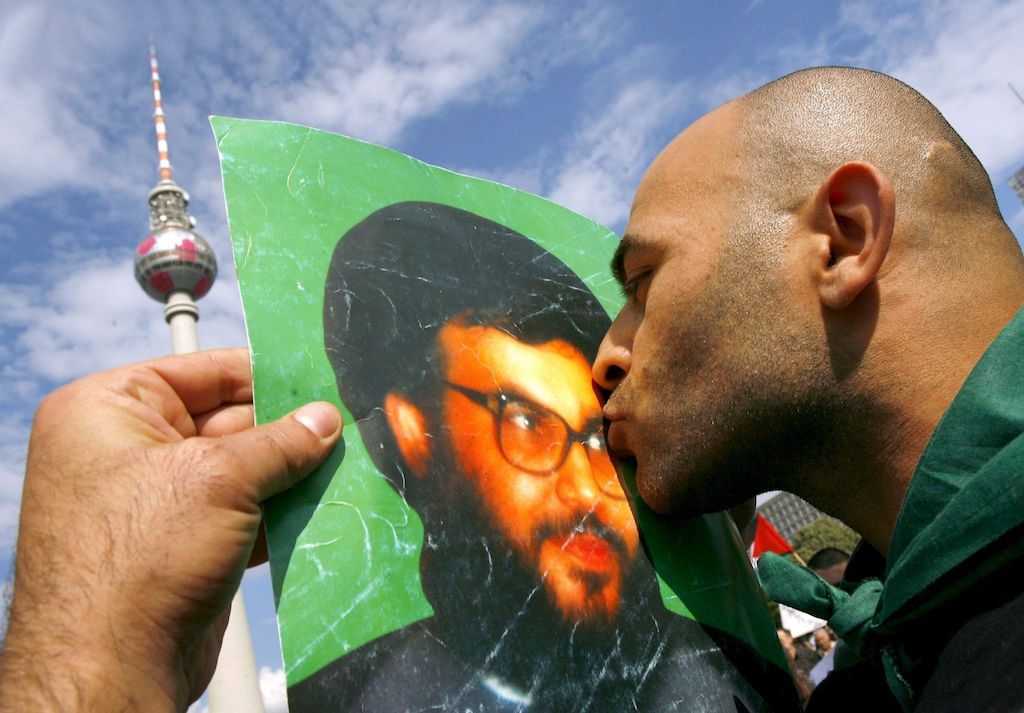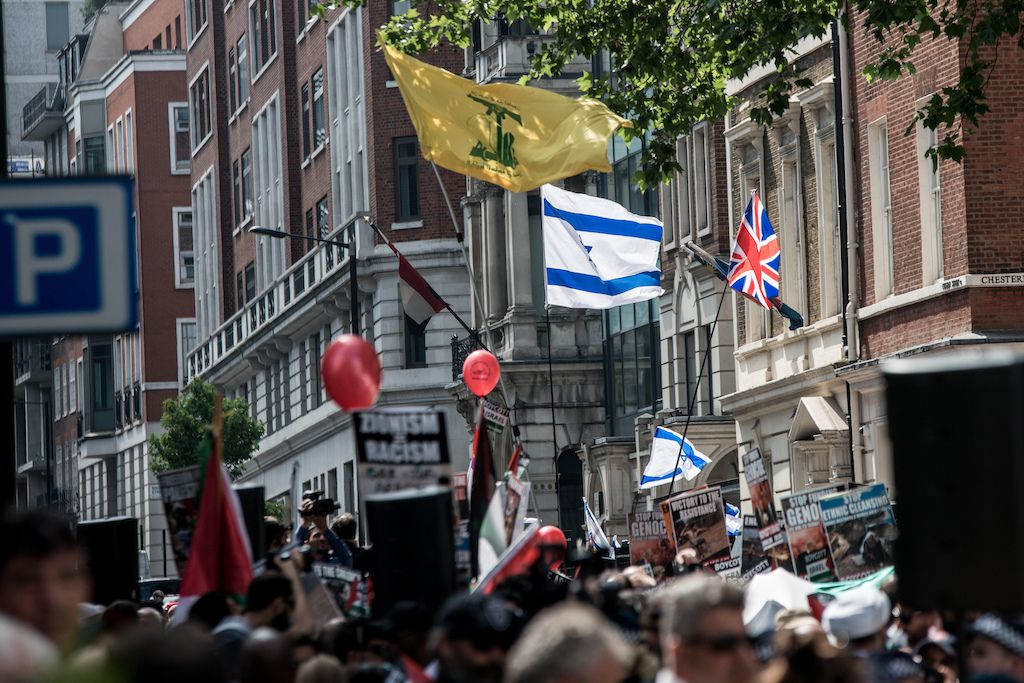The EU dithers in the face of Iranian terror
Europe’s policy of appeasement toward Hezbollah included looking the other way and even hiding evidence from the public on its acts of terror. Most governments in Europe stick to the view that Hezbollah is a legitimate political force in Lebanon and ignore pleas from Israel and the U.S. for solidarity in trying to tame Tehran’s aggression.

In a nutshell
- Iran and its proxy Hezbollah feel free to kill foes in Europe because its leaders are bending over backward to ignore it
- In some cases, European governments were hiding the scope of Hezbollah’s terror plans from the public
- Most of the planned attacks were foiled, in part thanks to information from Israeli and U.S. intelligence
Iran’s ruling clerics have been carrying out terrorist operations in Europe since Ayatollah Ruhollah Khomeini rose to power in Tehran in 1979. In the 1980s, the revolutionary regime also began operating through its Hezbollah proxies. Despite repeated warnings from their respective intelligence agencies, European countries have limited themselves to issuing vague condemnations of the perpetrators, without doing much to address the problem. As a result, Iran and Hezbollah feel free to continue their not-so-secret war, while differences of opinion between NATO member nations weaken the cohesion of the Western alliance and isolate the United States in its confrontation with Iran.
A stark illustration of this sordid state of affairs appeared in the July 31 issue of the French daily Le Monde. The newspaper revealed that at a June meeting of the country’s Secretariat-General for National Defense and Security, with President Emmanuel Macron in attendance, intelligence organizations were ordered to temper their criticism of what they called “Iranian state terrorism.” The objective was to avoid weakening French efforts to “save” the nuclear treaty with Tehran. In the face of a long string of terror attempts by Hezbollah inside the EU, including France, the European policy of appeasement continues.
Opposition activists under attack
Exactly one year earlier, in June 2018, a major terror attack against members of Iranian opposition group Mujahedin-e Khalq (MEK) in a Paris suburb was foiled due to information supplied by Mossad, Israel’s national intelligence agency. Two Iranian operatives were arrested in Belgium with explosives and a detonator for a bomb in their car. The device was meant to be exploded during a MEK meeting. In Berlin, Asadollah Assadi, an Iranian diplomat posted in Vienna who had been managing the two operatives, was also detained.
It was a strange response to what could have been a massacre.
Faced with undeniable evidence, France accused Iran of preparing the attack, and, disregarding Tehran’s denials, expelled an Iranian diplomat known to be a spy. It also officially froze the assets of Mr. Assadi, of the Iranian deputy minister for intelligence and those of Iran’s Ministry of Intelligence and Security. It was a strange response to what could have been a massacre, considering that neither the men nor the Iranian intelligence agency had assets in France.
In the same month of 2018, two Iranian diplomats were expelled from the Netherlands for planning attacks against Iranian opposition members. Dutch officials announced that Iranian secret services assassinated a pair of activists in 2015 and 2017. In October 2018, Denmark revealed (based on information supplied by Israel) that Iran was planning to murder a regime opponent living on its territory.
Also in June 2018, the United Kingdom disclosed that a major terror plot planned by Iran and Hezbollah had been foiled in 2015. British security services had discovered at that time a Hezbollah cell in a London suburb, where militants had huge stores of components for making bombs in a makeshift factory. The scale of the preparations reportedly shocked then-Prime Minister David Cameron and Home Secretary Minister Theresa May: ammonium nitrate used for homemade bombs had been stashed in thousands of ice packs. According to media reports, there would have been enough of it to manufacture tons of explosives.
Hiding alarming facts
That was a clear and alarming indication that Iran had long-range plans for an eventual conflict with Europe. But in that 2015 case, too, a European government decided against making vital information known to the public for fear it could derail the nuclear agreement with Iran negotiated a mere five months earlier. The British kept quiet despite their knowledge of a similar incident in Cyprus in 2012. Following a tip from Israel, a Hezbollah operative named Hassan Abdallah was then caught with 65,000 packs of ice filled with ammonium nitrate. The man admitted during his trial that the chemicals had been intended for making explosives and conducting terror attacks; he was sentenced to six years in prison.
Some of the plots have not been publicly revealed to this day.
Cyprus is a member of the European Union. All member states were informed of the case and its implications, but apparently, there was no urge to take retaliatory measures against Iran or Hezbollah.
The Cyprus incident was only one of the many attempted or executed attacks, against not only Israelis or Iranian dissidents on EU soil, but also against American and British targets throughout the world, in Thailand, Singapore, Azerbaijan, South Africa, Nigeria and Canada. Most of these attempts were foiled with the use of information from Israeli, U.S. or local sources. Some of the plots have not been publicly revealed to this day.
Unfortunately, two were successful. In 2012, a local Iranian cell attacked and injured an Israeli diplomat in New Delhi. In the same year, two Hezbollah terrorists opened fire on a tourist bus at Burgas airport in Bulgaria, killing five Israeli civilians and the Bulgarian driver. (The terrorists were identified but managed to flee and are allegedly living in Lebanon.) A few weeks earlier, a Hezbollah terrorist holding a Swedish passport was arrested in the Cypriot port of Limassol, where he was monitoring arrivals of Israeli tourists. The man was coordinating the activities of Hezbollah cells in Europe, especially in France and the Netherlands, and also in Turkey. (He was sentenced to four years in prison).
Designation disagreement
After the Burgas attack, European leaders could no longer turn a blind eye to what was being done in their countries. In July 2013, the EU branded the military branch of Hezbollah a terror organization. The U.S. and Israel argued that the group in its entirety was a terrorist outfit led by one single leader, with all members considered soldiers expected to execute violent operations as ordered by that leader, Hassan Nasrallah. Hezbollah Deputy Secretary-General Naim Qassem declared in 2012 that the organization does not “have a military wing and a political one; we don’t have Hezbollah on the one hand and the resistance party on the other.” Yet some EU countries decided that Hezbollah was an important part of the political and social fabric of Lebanon and it was vital for the EU to keep the door open for future talks with it as a political actor.
The U.S., Canada, Australia, Saudi Arabia, the Emirates and the Arab League, as well as the Netherlands, a member of the EU, have all disagreed and designated Hezbollah a terror organization, period, banning any contact with it. Of late, they were joined by Argentina and Paraguay, which were fed up with Hezbollah’s Latin American activities: drug trafficking, arms smuggling and training terrorists in a triangle-shaped area bordering Argentina, Paraguay and Brazil. The latter country is still weighing the designation issue.
If there had been such an understanding, however, it collapsed after 2012.
Following the 2018 disclosure of the dimensions of the 2015 bomb-factory plot, the UK also decided to join the ban, becoming the second EU country to do so. Nevertheless, none of the remaining EU states appear ready to cross this line. It has been alleged that there was once an understanding between some European countries and the terrorist organization: as long as Hezbollah operatives refrained from further actions on those countries’ territory, their authorities would look the other way.

Revolting as such a pact would be, the fact is that Europe knew a period of calm after the deadly attacks of the 1980s and the 1990s, while Hezbollah intensified its activities elsewhere in the world.If there had been such an understanding, however, it collapsed after 2012. Iran’s interests overrode other considerations, its leaders feeling secure in the belief that Europe would not depart from the appeasement policy.
And indeed, as if to assuage its conscience, the EU chooses to depict Hezbollah as a part of Lebanon’s multicultural society, a political party running a vast network of charitable activities. Banning it, the policy’s defenders insist, would destabilize Lebanon. The European community loathes admitting that Hezbollah is Tehran’s armed tool for implementing its grand design, a Shia crescent virtually encircling Saudi Arabia.
Collateral damage
Doing its patron’s bidding, Hezbollah undermines the stability of some of the region’s ruling regimes and militarily assists Bashar al-Assad’s regime in Syria, as well as trains Houthi rebels in Yemen and Shia minorities in the Gulf states. It steadfastly calls for the destruction of Israel and has amassed an imposing arsenal of weapons for that purpose. It also dispatches operatives to murder opponents in Europe, with no consideration for the collateral damage among citizens of the targeted countries. To help finance these activities, Hezbollah is involved in drug trafficking and money laundering. It also raises funds in Europe through so-called charitable institutions, often set up illegally and operating with no state supervision.
As the current U.S. Ambassador to Germany Richard Grenell recently tweeted, “Hezbollah is hunting for money in Europe. Ignoring them is what they want.” According to the city of Hamburg’s intelligence agency, quoted by The Jerusalem Post on July 14, 2018, there are about one thousand Hezbollah members or supporters in Germany, tied to 30 mosques and cultural centers. They organize demonstrations calling for Israel’s demise and raise funds for the organization’s terrorist activities. Nonetheless, the government of Chancellor Angela Merkel will not brand Hezbollah a terrorist organization or ban its operations in Germany.
The events of 2018, however, have had some effect: 60 members of the European Parliament raised excellent points in their interpellation on December 8 of the same year. The parliamentarians asked:
· Does the EU acknowledge that Iranian state terrorism and Shi’a groups operating at the behest of Iran – such as Hezbollah – pose a threat to European security?
· Why didn’t the EEAS (European External Action Service, the EU’s diplomatic service) publicly condemn the recent terror plots or at least express its solidarity with the targeted member states? Why hasn’t the Iranian ambassador to the EU been summoned? What, if anything, is the EU doing in order to curtail Iran’s criminal and terrorist activities in Europe?
· Is the EU considering proscribing the Islamic Revolutionary Guards Corps (IRGC) and Hezbollah in its entirety in order to deter Iran from carrying out further attacks in Europe?
Under heavy pressure from several member states – notably Denmark and the Netherlands – the EU moved to impose sanctions on Iran for the first time since the signing of the nuclear treaty in 2015. What was done, however, was “freezing” the same, nonexistent Iranian assets that had been already “frozen” by France; in short, a gesture with no practical significance. The ayatollahs in Tehran and Mr. Nasrallah in Beirut tried not to laugh openly. More to the point, the Iranians must have concluded that they could apply more pressure on Europe and hastened to do so.
Disagreement with the U.S.
Europe, they understood, had opposed America’s unilateral withdrawal from the nuclear agreement and would do almost anything to preserve that agreement – including helping Iran in its tug of war with the U.S. Tehran was confident that European countries would put pressure on oil and trade companies not to stop doing business with Iran, despite Washington’s sanctions. Those companies, however, opted to comply with the sanctions for fear of losing access to the vast U.S. market. The EU then attempted to set up an alternate transaction system, called INSTEX, to circumvent the sanctions blocking Iran from using the global SWIFT payment messaging system. This scheme, too, never got off the ground, as major financial institutions refused to take part and risk a U.S. backlash.
NATO members seem unable to have a meaningful dialogue on security issues.
Tehran then attacked and took control of several oil tankers in the Strait of Hormuz. It declared that since the remaining signatories to the nuclear agreement – the four permanent members of the Security Council (less the U.S.) and Germany – were not doing enough to help fight the sanctions, Iran would feel free to depart from that agreement. Indeed, it reportedly increased the percentage of uranium enrichment from 3.67 percent to 5 percent, and the quantity of enriched uranium rose beyond the 300 kilograms limit it had agreed to observe.
The EU feebly remonstrated, while its foreign ministers declared the violations too insignificant to prompt Europe’s withdrawal from the agreement. France and Germany also announced that they would not take part in the naval force that U.S. President Donald Trump proposed to set up to protect oil tankers in the Strait of Hormuz. Only the UK and Australia agreed to do so. Israel announced that it would supply intelligence data to the naval force, which provoked an angry reaction from Tehran.
The U.S. is applying maximum pressure to enforce its sanctions, as the Trump administration’s aim is to bring Iran to the negotiating table and hammer out a better, more complete nuclear accord. It has received, however, no help from its NATO allies in this project. How secure can NATO be if its key members are unable to have a meaningful dialogue on how to address grave security issues threatening the peace of the world?
In June 2018, after a meeting at NATO headquarters in Brussels, Acting U.S. Defense Secretary Mark Esper said that he had asked his fellow defense ministers “to help the U.S. maintain the freedom of navigation in the Strait of Hormuz, the Persian Gulf and wherever,” but received no firm commitments.
Caught between the U.S. and Iran, Europe continues to vacillate. Tehran and Washington keep repeating that they do not want a war, but as the sanctions bite harder on the Iranian economy, the ruling ayatollahs are ramping up their provocations. They reason it will force apprehensive Europe to come to Iran’s rescue – which is playing with fire, as, at any given moment, a local incident may spiral out of control. Following the September 14 attack on Saudi Arabia’s oil refinery, the UK, France and Germany all agreed at the UN that Iran bears responsibility for the hostile act but stopped short of condemning it. The policy of appeasement continues.
President Trump has no wish to be embroiled in a war during his reelection campaign, but he felt he had to respond to Tehran’s aggressive behavior and imposed more sanctions on Iran. It is generally assumed that the ayatollas will now show some restraint, banking on the election of a Democratic president in 2020 who would restore American participation in the nuclear agreement – to Europe’s applause. This assumption is likely wrong since even a Democrat in the White House would think twice before taking such a step in the absence of serious negotiations to address the accord’s fatal flaws. Meanwhile, Hezbollah and Iran will continue sending their murderous squads to Europe with impunity.








